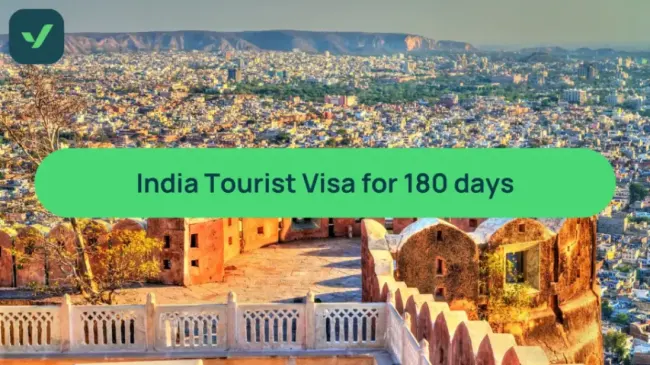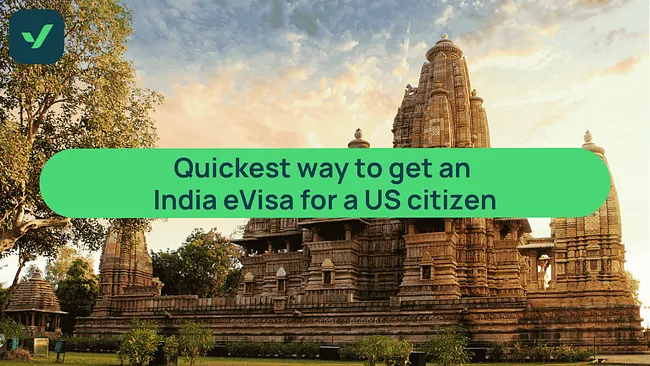
India
Welcome to India
Traveling to India? You may need a visa – find out if you do, which type, and how to apply so you can get the paperwork out of the way and focus on your trip.
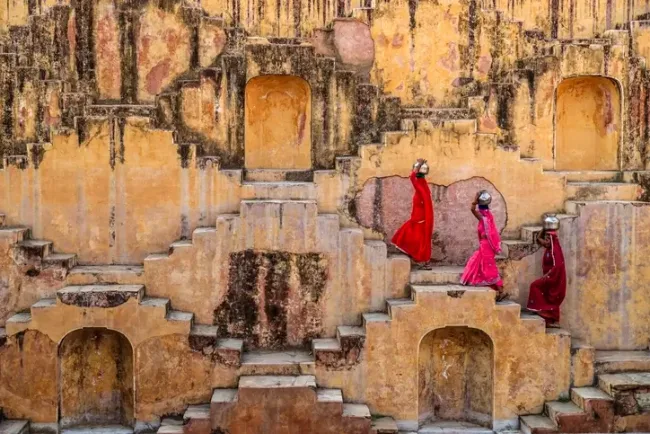
What’s an India Tourist eVisitor Visa and who’s it for?
Who’s the Indian eVisitor Visa (Tourist Visa) for? Travelers from the European Union, the United States, the United Kingdom, all South American countries, Australia, New Zealand, Singapore, South Africa, South Korea, Japan, Russia, the Philippines, and more.
Who’s not eligible for an Indian eVisitor Visa?
-
Maldivian nationals can enter India for up to 90 days without a visa.
-
Nationals from Japan, South Korea, and the United Arab Emirates can obtain a Visa on Arrival at airports in Bengaluru, Chennai, Delhi, Hyderabad, Kolkata, and Mumbai.
-
Those who require an Embassy Visa instead, such as Chinese nationals.
What’s the purpose of an Indian eVisitor Visa?
Tourism activities like sightseeing, holidays, and visiting family.
How long can you stay with an Indian Tourist eVisitor?
There are different types of Tourist eVisas for India, each tailored to your travel needs:
-
30-Day Double-Entry eVisa: This eVisa is valid for 1 year after issued and allows you to enter the country twice within that period. The duration of both stays is limited to 30 days.
-
1-Year Multiple-Entry eVisa: This eVisa has a validity of one year, allowing you multiple entries into India within this period. Each visit is restricted to a maximum of 90 days, except for citizens of the U.S., UK, and Canada, who can stay for up to 180 days per visit.
-
5-Year Multiple-Entry eVisa: Valid for five years, this eVisa enables you to make multiple trips to India within 5 years. Similar to the 1-Year eVisa, each stay is limited to 90 days except for U.S., UK, and Canada citizens, who can stay for up to 180 days per visit.
Important info on the validity of your visa
Take note of the following:
-
Validity: The date from which your visa is valid and for how long.
-
Stay limit: The number of days you can stay once you enter the country.
E.g., if your visa expiry date is May 1, 2024, you have until that day to enter the country.
Once there, the validity tells you how many days you can spend in the country. E.g. You arrive on May 1, 2024, and your visa validity is 30 days. In this case, you can stay until 30 May 2024.
Check our blog for more detailed information on the validity of your India Tourist Visa.
What’s an India eBusiness Visa and who’s it for?
Who’s the Indian eBusiness Visa for?
Business travelers from more than 160 countries worldwide can apply for an Indian eBusiness Visa.
What’s the purpose of an Indian eBusiness Visa? This visa is designed for those who’d like to expand their business in India. You can do the following activities while in the country:
-
Attend business meetings and events.
-
Meet with (potential) suppliers, clients, and other business partners.
-
Deliver, install, or maintain products.
-
Give advice or implement or deliver other business services.
-
Recruit personnel.
N.B. you’re not allowed to work in India with your Business Visa; for that, you’ll need to apply for an employment visa via the India Embassy instead.
How long can you stay with an Indian eBusiness Visa?
Your Indian eBusiness Visa allows you to stay in the country for up to 180 days on each visit, within the validity period of one year.
What’s an India Embassy Visa and who’s it for?
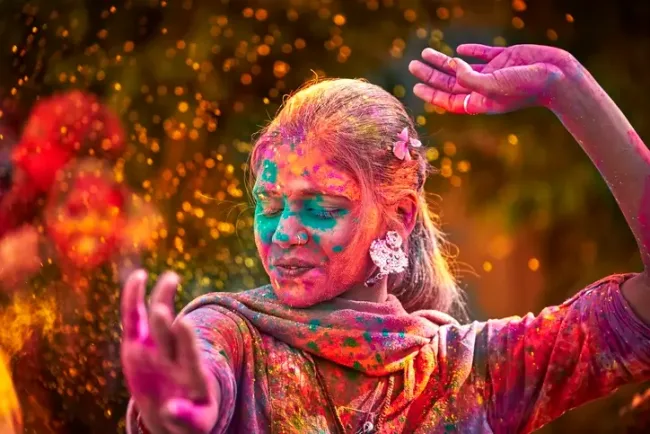
Who’s the Indian Embassy Visa for?
This traditional India Embassy Visa is designed for travelers who need an Indian visa but aren’t eligible for the eVisa. Use our iVisa Checker Tool to determine which visa you require.
What’s the purpose of an India Embassy Visa?
This visa is only meant for tourist activities, like exploring the country and meeting with friends or family.
How long can you stay with an India Embassy Visa?
This multiple-entry document comes with a validity period that ranges from 5 to 10 years, based on your nationality.
Once approved, foreign travelers can stay in India between 90 and 180 days in total.
What’s an India eMedical Visa and who’s it for?
Who’s the Indian Medical Visa for? Those who want to undergo specific medical treatment in India, after getting authorization from their hospital or care provider in their home country. There is also a special eMedical Attendant Visa for those who want to assist a patient during their trip.
How long can you stay with an Indian eMedical Visa?
The Indian eMedical Visa is good for 60 days once you arrive in India. So, from the time your visa gets approved, and you set foot in the country, you've got a two-month window to get your treatment, heal, and manage any aftercare.
Plus, it gives you the flexibility of three entries into the country to account for any follow-up appointments.
What’s an India Transit Visa and who’s it for?
Who’s the Indian Transit Visa for?
An Indian Transit Visa is what you'll need if you're just passing through India to get to another destination. You've got to show solid proof of your travel plans, like valid tickets for your journey that takes you through India.
Who doesn’t need an Indian Transit Visa? You don’t need an Indian Transit Visa if you’re passing through India via air, as long as you don’t leave the specified airport precincts.
If you’re traveling by sea, you also don’t need an Indian Transit Visa, as long as you don’t leave the ship.
What’s the purpose of an Indian Transit Visa?
An Indian Transit Visa is for travelers passing through the country to a destination outside India.
How long can you stay with an Indian Transit Visa?
Depending on your itinerary, you can choose a single- or double-entry visa, valid for a maximum of 15 days.
At iVisa, we currently don’t offer an Indian Transit Visa, but you can find out more from the Indian Ministry of Home Affairs.
What are the Indian long-term visa options?
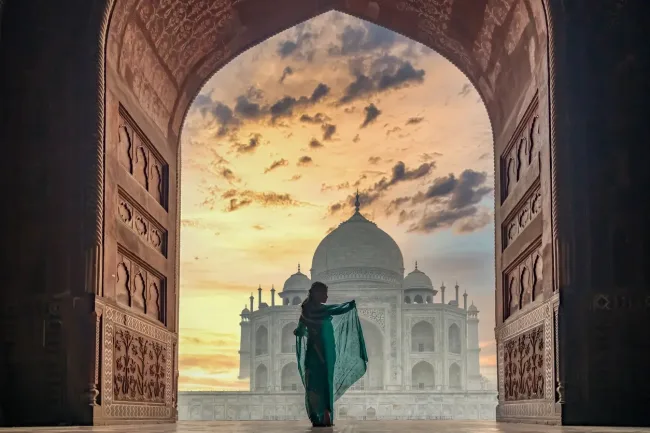
India offers several long-term visa options for various purposes, such as employment, study, business, and residence. Here are some of the common long-term visas:
-
Employment Visa: Employment visas are for skilled pros like technicians, technical experts, or senior execs who've got jobs lined up with companies or organizations in India.
-
Student Visa: A Student Visa is for those looking to focus solely on full-time academics in India. It's valid either for the length of your course or up to five years, whichever comes first, at recognized educational institutions.
-
Research Visa: A Research Visa is for diving into academic research at a recognized institution in India, for the duration of the work to be done (up to 3 years).
-
Intern Visa: This visa is for foreigners who want to intern at Indian companies, schools, or NGOs.
-
Film Visa: Issued for the shooting of feature and ad films, valid for up to 1 year.
-
Journalist Visa: Journalist visas are given to professional journalists and photographers to stay for up to three months in India.
At iVisa, we currently don’t offer these visas, but you can find out more from the Indian Ministry of Home Affairs.
Staying healthy in India: Here’s what you need to know
Healthcare facilities and standards in India can vary significantly depending on the location and the type of facility. Here's what travelers should know.
Make sure to stay updated on routine vaccines
-
Consider vaccines for diseases like Hepatitis A and Typhoid, which you can get through contaminated food or water in India.
-
A yellow fever vaccination certificate is required from travelers aged 9 months and over arriving within 6 days of departure from an area with a risk of yellow fever transmission.
-
Keep updated with India's COVID-19 requirements, such as quarantine, testing, or vaccine certificates, through your airline or the Indian government website.
Medical facilities
-
In urban areas, private hospitals and specialized centers usually offer high-quality healthcare services. These are also the ones primarily used for medical tourism.
-
Public hospitals and facilities in rural areas are often crowded and may not meet international standards, although they can handle basic medical needs.
-
Pharmacies are widely available and stocked with a broad range of medications, often available without a prescription.
Health insurance
We’d always recommend taking out health insurance before you travel anywhere from any destination. All the major cities in India will have private medical care, but it’s expensive. You should choose travel insurance with high medical limits.
Contact your insurance provider before traveling to ensure you have the right level of coverage.
Other things to consider:
-
Trip cancellation, delay, and interruption benefits.
-
Medical expenses and medical evacuation benefits.
-
Baggage coverage.
Things to be aware of when visiting India
Keep an extra eye on the following to keep healthy and safe during your trip to India:
1. Food and water contamination: Issues like travelers' diarrhea (sometimes called Delhi belly) are very common. Stick to bottled or boiled water and eat well-cooked food from reputable sources. Be careful with street food and swimming in dirty water.
2. Mosquito-borne illnesses: Dengue fever, chikungunya, and malaria are present, especially in rural areas and in the monsoon season. Using mosquito repellent and wearing long-sleeved clothing can help prevent bites.
3. Animal hazards: Rabies exists in India, especially in stray dogs. Consider getting a rabies shot before departure, and if bitten, seek medical attention immediately for post-exposure prophylaxis. Leptospirosis, transmitted through water contaminated with animal urine, is common during the monsoon season.
4. Air pollution: In cities like Delhi, air pollution can exacerbate asthma and other respiratory conditions. Tuberculosis is mainly a risk for those visiting for an extended period, but still worth being aware of.
Medication for personal use
Follow these tips to bring into India some over-the-counter medicines:
-
Declare all medications: Report all medication for personal use to customs authorities.
-
Original packaging: Always keep medicines in their original containers and in transparent bags in your hand luggage.
-
Prescription or doctor's letter: Present the medical prescription issued by your doctor or other competent authority, in English.
-
Check for restrictions: Call India's embassy to verify that all of your prescription(s) are legal to bring with you.
-
Quantity aligned with itinerary: Bring only a reasonable quantity that aligns with the duration of your stay to avoid complications.

 Australia ETA Online
Australia ETA Online
 United Kingdom ETA
United Kingdom ETA
 India Tourist eVisa
India Tourist eVisa
 Canada ETA Visa
Canada ETA Visa
 Turkey eVisa
Turkey eVisa
 Egypt eVisa
Egypt eVisa
 Singapore SG Arrival Card
Singapore SG Arrival Card
 Indonesia eVoa Visa
Indonesia eVoa Visa
 Aruba ED Card
Aruba ED Card
